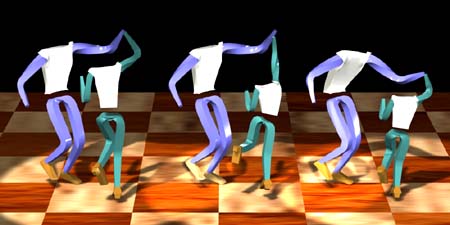CS838 - Topics in Computer Animation

Last modified: 20:40 Mar 3, 1999
Administrative Details:
- Instructor
- Michael
Gleicher (gleicher@cs.wisc.edu)
Office Hours: Tuesday, 2:45-3:45, Thursday 11-12, or by
appointment
- Course Meetings
- 1-2:15 Tuesday/Thursday
1221 Comp Sci & Stats (note: this is a big room for a small
class, so sit in front!)
- Course Web Page:
- http://www.cs.wisc.edu/~cs838-3
- Texts:
- There is no required texts. Some of the papers you will be
required to read will be placed in a reader, for sale at the DOIT
store in the Comp Sci building. There are some optional texts. See
the course books and readings pages for more info.
Course Requirements
- Project
- The major task in this course is to complete a project. This
includes selecting a topic, submitting a proposal, doing the
actual work, presenting the results, and creating an animation
based on the project.
NEW: Instead of completing a project, you may instead
chose to do a programming assignment and a "mini-project".
- Assignments
- There will be a small number of introductory assignments to
complete, predominantly at the beginning of the course.
- Readings
- Readings will be assigned for each lecture. Papers will be
available in the reader, or links to things on the web will be
provided. Sometimes you will be asked to read things on the web,
or in books that will be placed in reserve in the library.
- Reviews / Discussion NEW
- You will be required to lead the discussion on a topic that
will be assigned to you. This work will be performed in pairs.
Between the two of you, you must: write reviews
of the assigned papers and auxillary papers (total of 4), and give
a presentation on the topic.
- Participation
- I hate to say "class participation" is part of the grade,
because it give images of me counting the number of questions that
each student asks over the course of the class. However, you are
expected to somehow provide me with the impression that you
actually are learning the material of the class. I may resort to
giving quizzes to better assess if people are learning from the
readings.
- Homeworks
- For many of the lectures, I will suggest homework assignments.
These are optional, but recommended. Generally, they will be
excersizes to help you appreciate the concepts that you are
reading about in papers or learning about in class.
Turning Things In
Everything that you turn in (assignments, paper reviews, project
proposal, project writeup, animations) you will put on the web so
that I (and the other students, and anyone else who wants to) can
view it. The exact format of the web pages don't matter (there's no
requirement that they be works of art, but I won't complain if it
is).
You will be given a space in the course directory to put your
hand-in web pages. In this directory, you should put an "index page"
(called index.html) that contains pointers to everything else that
you put in this directory. By the end of the course, this should
contain links to everything in the course requirements.
Late Policy:
All assignments and projects are due by 5pm on the date specified.
You will be given a "grace period" until the beginning of the next
class after that date in which to complete the assignment.
Assignments will not be accepted after that unless arrangements are
made before the due date.
Grading
This course will be graded on an A-F scale.
If you choose to do a project, it will be the only thing in the
course that will actually be graded on an A-F scale. If you choose
the programming assignment option, both the programming assignment
and the mini-project will be graded on an
Everything else will be marked as done or not done, and possibly
noted as "done above and beyond the call of duty."
Your final grade will be determined by your project grade,
adjusted by the other course requirements. To recieve an A, you must
not only get an A on the project, but complete all the course
requirements.

